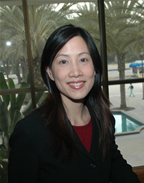How Healthy Are China’s Citizens?
Economist Explores Relationship Between Economic Status and Nutritional Choices
February 12, 2007
By Pamela McLaren
More than 40 years after the Cultural Revolution in the People’s Republic of China, a growing number of that country’s citizens are reaping the benefits of economic reforms.
But a growing disparity has been developing between the Chinese, depending often on where they live and their socio-economic status, notes Davina Ling, assistant professor of economics, who just returned following a four-week stay in China.
A researcher with interests in health economics and aging, Ling has been exploring how ‘relative income’ — a person’s position in the income distribution, particularly in comparison to those richer then him or her — can affect the health of the Chinese. She’s finding out that the results are not always favorable, especially for children and the elderly. Although the country has experienced tremendous economic growth, “that doesn’t mean that the population is necessarily healthier,” she noted.
Ling has been delving into public health literature and insights from recent research on happiness and economic growth.
She also been utilizing longitudinal data collected by researchers from the University of North Carolina’s Carolina Population Center, National Institute of Nutrition and Food Safety and the Chinese Center for Disease Control and Prevention to examine how ‘relative deprivation’ — or being less well off when compared to others — affects anthropometric measures of health, such as body mass index, waist circumference and blood pressure.
Ling says that the idea of ‘Keeping up with the Jones’ is becoming more prevalent in the Asian country and as a result, “How does it affect health and citizen’s patterns of nutritional intake?” she says.
“As the Chinese are growing richer, they are changing their patterns of consumption and behaving in certain ways for the status value, such as buying expensive vacations of high-end merchandise,” says Ling. “This may divert them from investing more in their own and their children’s health.”
“The richest people in a community may not have the best nutrition and may engage in behavior that implies a higher status, such as smoking and drinking, but may not contribute to their overall health.”
Ling, who joined the university in 2003 and heads up the Center for the Study of Economics of Aging and Health, is also researching the relationship between economic factors, birth order and childhood obesity — a study she is conducting with department associate Andrew Gill. Besides using U.S. data, they also are contrasting the relationship between birth order and children’s health in U.S. versus China to highlight the impact of culture.
Working with associates from the University of Southern California and the China Research Center on Aging in Beijing, Ling also is examining aging issues in China, including whether having children enhances old age security.
Ling holds a doctorate in economics from the Massachusetts Institute of Technology and obtained her post-doctoral training in health economics at Harvard Medical School and Harvard School of Public Health.

